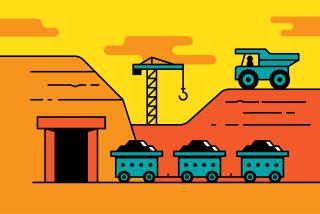Saber-Rattling in a Colorado Town
- Share via
WARD, Colo. — In this secluded mountain hideaway brimming with offbeat people, Derik Leif Stevens stands out.
“You can’t miss him,” said Curtis Sullivan, town councilman and East Coast refugee. “He’s usually got his loincloth or kilt on and is carrying a sword.”
On this clear day in a town about 9,300 feet above sea level, Stevens opted for the loincloth. The 29-year-old walked into Ward’s two-store business district, bare chested and carrying a gleaming sword he forged at his tree-shrouded livery stable.
Besides being Ward’s blacksmith, Stevens hosts a popular “toughman” contest every spring in a field behind the town’s 130-year-old general store.
Stevens will take on all comers in a boxing match that raises money for a mountain bike or tepee for Ward’s children.
If an opponent knocks Stevens out of a circle or makes him bleed, he gives the victor a sword or hatchet he made.
“It’s all good-natured. It’s all for fun,” said Stevens, a wiry martial-arts practitioner.
It’s not a traditional fund drive. But then Ward is not a traditional town.
“It has the most interesting collection of folks and attitudes in the state,” said Chuck Stout, executive director of the Boulder County Health Department.
Ward’s 170 or so residents don’t embrace growth nor have they traditionally welcomed too many tourists at once.
The old hippie culture runs deep here, as do rumors that Ward used to be a drug haven or once hid fugitive newspaper heiress Patty Hearst.
So it’s not surprising that Ward fought the idea of rolling under the thumb of the federal Environmental Protection Agency in order to clean up old mines surrounding the town.
“A lot of people don’t want a bunch of agencies involved in their lives and looking over their shoulders,” Mayor Christina Zahn said.
Ward and neighboring Jamestown once were home to thousands of people toward the end of the 19th century. Most were drawn to the gold, ore and fluorspar that enriched the local hills.
The mining eventually played out, and the prospectors and mining companies left. But the holes they dug continued to bleed metals into local creeks and tributaries.
That led the EPA and county officials in the late 1990s to talk about making those old mines and mills Superfund cleanup sites. Officials worried that the leaking materials could someday contaminate the drinking water of 14,000 Left Hand Water District customers down below.
Once part of the Superfund, however, the mine cleanup could get federal dollars.
At first, EPA officials said, both towns seemed willing to agree with the Superfund idea. But as word crisscrossed over the craggy mountain peaks separating Ward and Jamestown, people became more nervous.
“We’ve heard nightmare stories about the Superfund,” said the 36-year-old Sullivan.
That included reports of a heavy-handed attitude by the EPA in previous Superfund projects, he said.
There was also a fear that Ward and Jamestown--which has a city park that could be one of the Superfund sites--would have to pay for any cleanup.
That could bankrupt Ward, which boasts an annual town budget of about $35,000, said local officials.
All of which got Ward and Jamestown to start a lobbying campaign to block the EPA’s efforts. It included letters to Gov. Bill Owens and Colorado’s two U. S. senators.
The EPA, which said it would only pursue the Superfund listing with each town’s support, backed off in June.
The agency said it will let Ward and Jamestown take up to a year to figure out how they want to tackle the mines.
Any future move will likely be voted on by the whole town, said Sullivan, the Ward councilman.
“Anything of just about any importance is put to a referendum,” he said.
Sullivan, in many ways, is a typical Ward resident. He came to Colorado from the East for a visit and decided to stay.
But the Front Range didn’t suit him, so he moved to Ward, where he works as a carpenter.
“I was just tired of living the rat race below,” he said.
Above the tiny downtown rest dozens of old cabins and small homes, next to rusting Jeeps and husks of junked cars. Most people in Ward are artisans and craftsmen who make their livings building things or selling art, Zahn said.
Fat dogs wander the town’s dusty main street and, on this day, they are joined by a young woman carrying a naked infant under her arm.
Nearby, Daniel Freeman sat sipping a cup of organic coffee freshly brewed at his store, the Glacier Gateway.
Freeman says no one should confuse Ward’s unwillingness to hop on the Superfund bandwagon as a reluctance to help the environment. He points to a recent agreement with Boulder County that effectively locks up nearly 1,000 acres around the town from development.
Everyone agrees a cleanup is needed. It’s just that they are not sure they want an outside agency doing the work, Freeman said.
Ward has always done a pretty good job of policing itself, said Boulder County Sheriff George Epp, thanks to the work of two volunteer marshals.
But in the 1960s and ‘70s, the town got a lot of attention from police for supposedly being a conduit for illegal drugs.
Ward’s reputation as an outlaw outpost is waning, however.
“People get older and they have kids,” Epp said.
More to Read
Sign up for Essential California
The most important California stories and recommendations in your inbox every morning.
You may occasionally receive promotional content from the Los Angeles Times.










